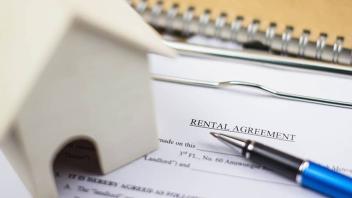Property Valuation: How to Determine Market Value of a Property
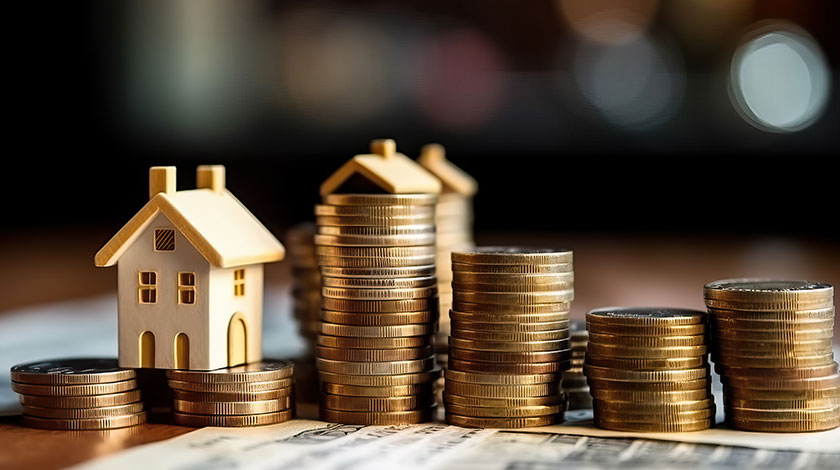
When it comes to the world of real estate in India, there's one cornerstone that's absolutely pivotal — property valuation.
Determining the correct market value of a property is the heartbeat of every real estate decision. Whether you're a first-time buyer, a seller, or even a real estate mogul, understanding the value of your property can make all the difference.
Ever wondered why one property in Delhi sells like hot 'samosas' while another in the next lane doesn’t seem to garner much attention? This is where the magic of 'market value' steps in.
The market value of a property is like its unique identity card, distinguishing it based on numerous factors which we'll delve into in more detail in this blog. In the vast and diverse real estate industry of our nation, market value of the property guides both buyers and sellers to make informed decisions.
So, let’s dive deep into understanding how to determine the market value of a property in India, various methods which you can use to calculate the value of your home, common mistakes you must avoid during property valuation, and much more. Trust us, by the end of this blog, you will look at properties in a whole new light!
Factors Affecting the Market Value of a Property
Real estate is a dynamic sector where property values can fluctuate based on a myriad of elements. If you're seeking to understand what drives the price of a house or an apartment, these critical factors play an instrumental role.

1. Location of the Property
This is the essence and a major deciding factor when it comes to property valuation. Safety of the locality, ease of access, proximity to commercial hubs, and neighbourhood prestige can elevate property values significantly. A property in a posh neighbourhood of Mumbai like Juhu or Bandra will command a premium simply due to its geographical desirability.
2. Age and Condition of the Property
A newly built property or a well-maintained old one can command higher prices. Whereas, properties showing signs of wear and tear, structural issues, or those in need of significant renovations might see a dip in their market value.
3. External Factors
- Overall Appearance: A building with a visually appealing facade, clean surroundings, and well-maintained common areas is more attractive to potential buyers.
- Local Infrastructure and Amenities: A property close to modern conveniences such as malls, hospitals, schools, or public transport hubs is likely to be in higher demand. Additional features like a well-maintained park, community centre, or even a gym can elevate the property's value.
4. Internal Factors
- Property Size and Usable Area: A spacious property, especially if it comes with additional usable areas like balconies or terraces, can increase the property’s value.
- Furnishing Status: A fully furnished home, with quality fittings, modern appliances, and elegant decor, often fetches a higher price compared to unfurnished or semi-furnished options.
5. Builder Reputation
A property developed by a reputed builder or developer often commands more trust and, consequently will have a higher market value. The assurance of quality construction, timely delivery, and adherence to regulations plays a big role here.
6. Market Demand and Supply
Property values are greatly influenced by the demand-to-supply ratio as well as the speed at which they are sold in the locality. If there's a high demand for properties in a particular area but limited availability, prices will naturally rise. However, unfavourable market conditions can impact the value of a property.
7. Recent Sales of Similar Properties
The selling prices of comparable properties (i.e., those properties having similar features, size, and amenities as the one being valuated) in the vicinity can provide a benchmark price. If similar homes or apartments in a locality have been selling at a certain rate, it provides a reliable gauge for assessing market value of any property.
8. Economic Factors
Macro-economic indicators like interest rates and economic growth directly affect property demand. For instance, lower interest rates might encourage an increase in the buying trend as loans become cheaper, and this in turn drives property values up. Conversely, during economic downturns, reduced buying power might lead to decreased property values.
9. Future Development Plans in the Area
If there are plans for new commercial hubs, infrastructural projects, or any other major developments in the pipeline for a particular locality, it can positively influence property prices. For example, the boom of IT industry in a locality in the North part of Bangalore (and its close proximity to the Airport) has led to a significant rise of property values in the last 5 years.
10. Legal and Title Status
A clear and undisputed title (like an Affidavit of Title from the seller) with all the required legal approvals can significantly enhance property value. In contrast, disputes or ambiguities on the property can discourage potential buyers, impacting the property's market value.
Understanding these factors and keeping them in mind will steer both buyers and sellers in the right direction, enabling them to successfully navigate the intricate maze of property valuation in India.
Methods to Calculate Market Value of a Property
Evaluating the market value of a property might seem like deciphering a complex puzzle, but with the right methods, it can be simplified. Whether you're a homeowner wanting to sell your home or a potential buyer, understanding these methods will empower you to make informed decisions.
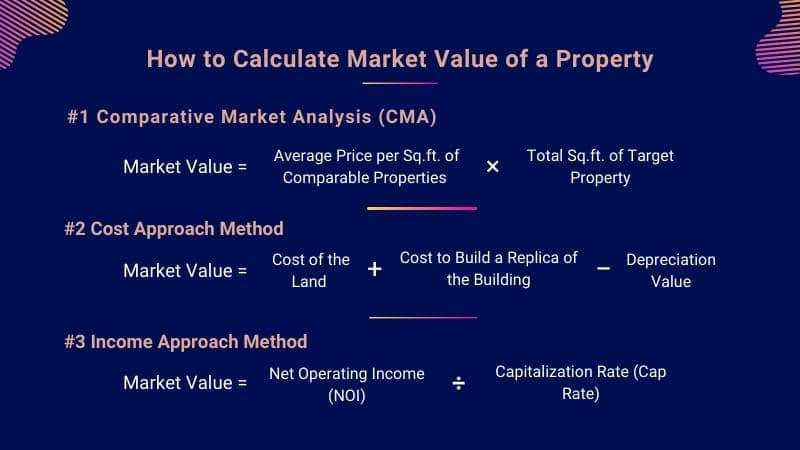
#1 Comparative Market Analysis (CMA)
This is one of the most commonly used methods, especially for residential properties. It involves comparing the property in question with recently sold properties (preferably within the last 6 months), in the same locality, that are similar in size, overall condition, age of the property, and features.
Check the sale price of at least 3-5 properties sharing at least 70-75% similarities. Take the average price per sq. ft. of these properties and multiply it by the total sq. ft. of your property to get a benchmark property value.
Formula: Market Value = Average Price per Sq.ft. of Comparable Properties × Sq.ft. of Target Property
Note: Adjustments should be made to the benchmark value if there are any unique features or differences between the properties. For instance, if your property has a bigger garden or an additional bedroom, it might be priced higher than the average.
#2 Cost Approach
This method is based on the idea that a potential buyer wouldn’t want to spend more on a property than it would cost to build an equivalent.
The Cost Approach method calculates the cost to build an exact replica of the existing property (or an equivalent with comparable features), subtracting any depreciation.
Formula: Market Value = Cost of Land + Cost to Build a Replica of the Building − Depreciation
#3 Income Approach
Income Approach is primarily used for rental or commercial properties (like office spaces or malls), wherein this method focuses on the potential income the property can generate.
Formula: Market Value = Net Operating Income (NOI) ÷ Capitalization Rate (Cap Rate)
Here, NOI is the annual income expected after all operating expenses but before deducting the taxes and mortgage payments, and the Cap Rate is the expected rate of return on an investment property.
#4 Expert Appraisal
Real estate professionals or valuers use a combination of the above methods, local market knowledge, and their expertise to provide an accurate valuation of the property.
Note: This method doesn't have a formula as such. Instead, it hinges on the expert's judgement, experience, and detailed analysis of the property.
#5 Use of Online Tools and Platforms
The digital age has brought forth numerous online platforms and tools that provide instant property valuations based on algorithms and vast databases of real estate transactions.
Note: While these tools can offer a quick estimate, they should ideally be used in conjunction with other methods. The results might vary based on the data and parameters the tool considers.
In conclusion, determining the market value of a property in India isn't a one-size-fits-all process. It's a blend of analysis, local market insights, and sometimes a touch of intuition. Whether you're leaning towards traditional methods like CMA or embracing the digital era with online tools, remember to always consider multiple avenues to arrive at the most accurate valuation price.
How to Estimate Market Value of a Property: Step-wise Checklist
Navigating the complex waters of property valuation can seem daunting. However, by following a structured approach, you can get a reliable estimate of a property's market value. Here's a step-by-step guide to make this journey smoother:
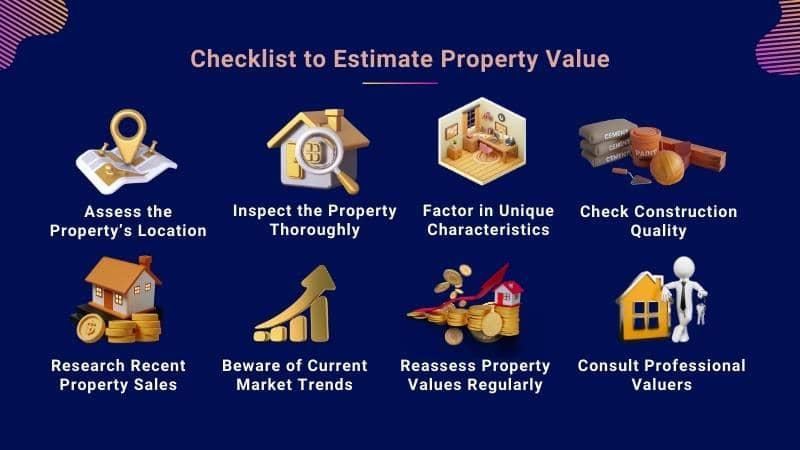
a. Assess the Location and Its Advantages
Understand the significance of the property's location. The convenience and desirability of a location can significantly influence a property's value. Is it in a bustling urban hub or a serene suburb? Is it close to major infrastructural landmarks like schools, hospitals, shopping centres, or public transport stations?
b. Check the Property Condition Thoroughly
It’s crucial to conduct a comprehensive inspection of the property. This will help you identify any potential structural issues, plumbing concerns, or electrical problems. A property in perfect condition will undoubtedly fetch a higher value than one needing significant repairs. Consider hiring a professional home inspector to get an unbiased view.
c. Factor in the Property's Unique Characteristics
Each property possesses characteristics that set it apart. This might include a panoramic view, availability of a personal terrace, or a unique architectural design. Acknowledge these features and determine how they might add to (or detract from) the property's value.
d. Check the Construction Quality
Not all properties are built equal. The quality of materials used, the craftsmanship, and even the architectural design can play pivotal roles in the valuation. Investigate details like the brand of fittings, the quality of woodwork, or the type of tiles used.
e. Research Recent Property Sales in the Area
Gather data about similar properties in the same locality. Look for properties in the vicinity that have been sold recently. Their selling prices can provide a benchmark for the valuation. (Refer to CMA Method of property valuation)
f. Be Aware of Current Market Trends
The real estate market is subject to fluctuations based on broader economic trends. Are property prices on an upward trajectory in the area or are they following a declining trend? Keeping an eye out for such trends can offer a clearer picture of your property’s market value.
g. Regularly Reassess the Value Over Time
A property's value evolves over time based on several factors, from infrastructural developments in the area to shifts in market demand. Therefore, make it a habit to periodically reassess the property’s value, especially if you're considering selling in the near future.
h. Consult Real Estate Professionals and Valuers
While doing personal research is invaluable, there’s no substitute for expert advice. Real estate agents or professional valuers have a detailed understanding of local markets and can provide an accurate and comprehensive valuation. Consult with them to validate your findings or to get deeper insights.
Also Read: Questions to Ask Real Estate Agents before Buying a House
Market Value & Fair Market Value: Definitions & Differences
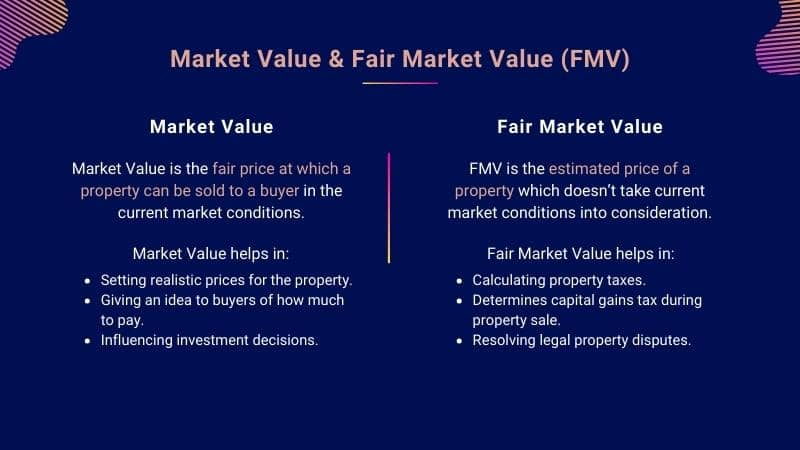
What is Market Value and Why is it Important?
Market value is the most probable price a property would bring in a competitive and open market under all conditions requisite to a fair sale.
Market value is crucial because it gives homeowners, buyers, and investors an idea of a property's current worth in the existing market, guiding them in buying, selling, and investment decisions.
What is Fair Market Value?
Fair Market Value (FMV) is the estimated price of a property for which it would sell in a transaction between a willing buyer and a willing seller, both having reasonable knowledge of the facts, neither being under any compulsion to buy or sell.
How does FMV differ from market value?
While both terms seem to imply the same idea, and take into account the property's location, condition, size, and features of the property, the distinction lies in the conditions of the property sale.
Market value can change based on immediate market dynamics and real-world factors affecting a sale. On the other hand, FMV is more of an idealised value, assuming ‘perfect’ or 'ideal' conditions for the sale.
There isn't a one-size-fits-all formula for FMV. Both Market Value and FMV consider recent sales of comparable properties, economic factors, and market demand and supply. Relevant adjustments are then made to suit ideal conditions.
To sum up, Market Value helps in setting realistic prices for listing, gives a tangible idea for buyers about how much to pay, and influences property investment decisions. Whereas, Fair Market Value helps in calculating property taxes, determining capital gains tax during property sale, resolving legal disputes involving property (e.g., estate division or divorce settlements), and insurance claims, where insurers need to ascertain the value of a property.
Also Read: All You Need to Know about Property Taxes
Importance of Accurate Property Valuation
An accurate valuation is the backbone of informed decision-making for different parties of interest. Let's delve into why getting this valuation right is important:
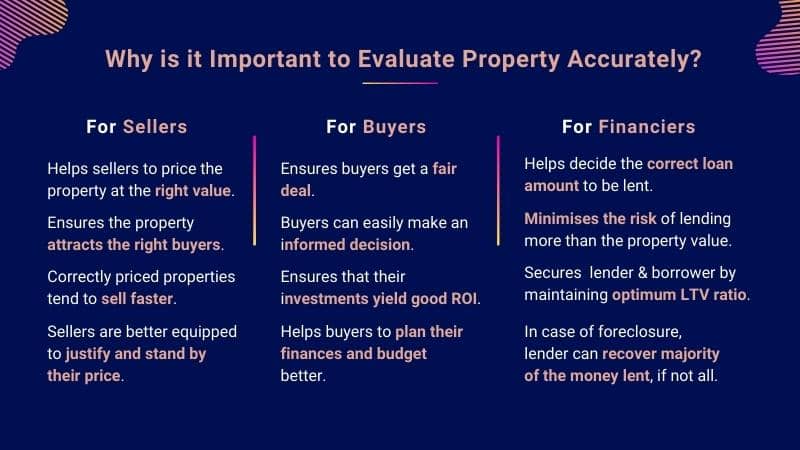
1. Helps Sellers to Price the Property at the Right Value
- Optimal Attractiveness: A property priced too high might repel potential buyers, while one priced too low could mean significant financial loss. An accurate valuation ensures the property attracts the right kind of attention and interest.
- Quick Turnaround: Correctly priced properties tend to sell faster. They resonate with the market's perception of value, leading to quicker closures of deals.
- Negotiation Power: With a precise valuation in hand, sellers are better equipped to negotiate. They have a benchmark, a rationale behind their price, making it easier to justify and stand by it during price negotiations.
2. Ensures Buyers are Getting a Fair Deal
- Informed Purchasing Decisions: A buyer equipped with an accurate valuation can ascertain whether a property's asking price is reasonable. This knowledge ensures they don't end up overpaying.
- Future Investment Security: For many, buying a home or property is a once-in-a-lifetime decision. An accurate valuation ensures that this investment holds its ground in terms of future resale value or rental income potential.
- Budgeting and Financial Planning: Knowing the correct value helps buyers plan their finances better, be it for down payments, loan EMIs, or associated property costs.
3. Helps Financiers Determine the Correct Loan Value
- Risk Management: Lenders base their loan amounts on the property's value. An accurate valuation ensures that they're not lending more than what the property is worth, thereby minimising their risk.
- Loan-to-Value Ratio (LTV): This is a crucial metric for lenders, depicting the loan amount against the property's value. An accurate valuation ensures that the Loan-to-Value Ratio is maintained at a sensible level, safeguarding the interests of both the financier and the borrower.
- Foreclosure Considerations: In unfortunate cases where foreclosure might be necessary, having lent based on an accurate property valuation ensures that the financier can recover the majority, if not all, of the loaned amount through the property's sale.
In India, all real estate deals are tied together by the need for accurate property valuation. From small sellers and buyers to huge financial institutions, this valuation has an effect on every choice, every negotiation, and every prediction about the future, making sure everyone is treated fairly, and building trust in the complex web of Indian real estate.
Common Mistakes Made during Property Valuation
In the intricate realm of property valuation, the margin for error can be slim but its consequences can be vast. A misjudged valuation can impact sale prices, loan amounts, or investment returns. Here are some common mistakes that could be made during this process and what to do to avoid them.
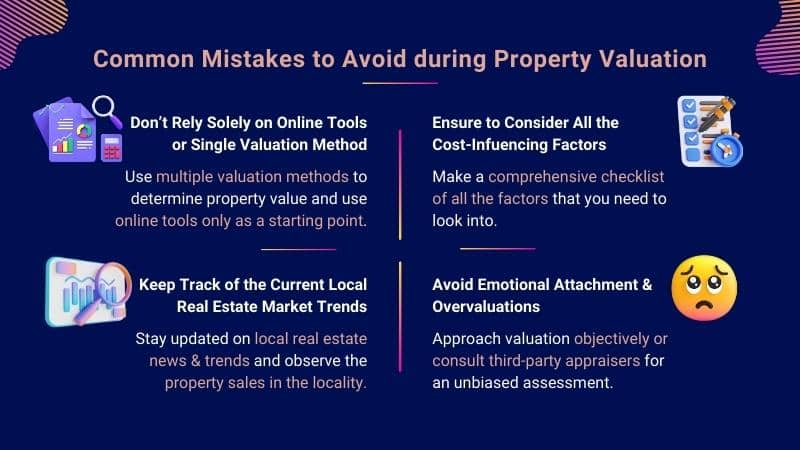
#1 Relying Solely on Online Tools or a Single Valuation Method
With the rise of digital technology, numerous online property valuation tools have emerged. While they offer convenience, relying solely on them can be misleading as these tools typically use algorithms based on available data, which might not always capture the actual market trends. Moreover, sticking to just one method of property valuation method might not paint the complete picture.
How to Fix This: Use online tools as a starting point or a ballpark figure. Always complement them with hands-on research and expert consultations. And, use multiple methods to determine a property's value, such as the Comparative Market Analysis or the Cost Approach.
#2 Not Considering All Influencing Factors
It's easy to focus solely on the obvious—like property size or location—and overlook factors like the legal status of the property, future development plans in the area, or even the reputation of the builder. Failing to account for these can misguide the valuation.
How to Fix This: Create a comprehensive checklist that encompasses all influencing factors, ensuring none of them slip through the cracks. Consider some aspects that can be easily overlooked like road construction, new public `transport stations, or even the opening of a popular mall or school.
#3 Overlooking the Local Real Estate Market Pulse
Real estate is a localised game. A booming market in one city or even one neighbourhood doesn't necessarily translate to another. Disregarding market downturns or economic factors and ignoring the local market dynamics can skew the property values greatly.
How to Fix This: Stay updated with local real estate news, interact with local realtors, and be observant of recent property sales in the vicinity. Also keep an eye out for broader economic conditions, like inflation rates, interest rate changes, or even national policy shifts, which can significantly influence property values.
#4 Emotional Attachment Leading to Overvaluation
For many, a property isn't just bricks and mortar; it's a repository of memories. This emotional attachment can cloud judgement, leading to overvaluation.
How to Fix This: Approach valuation objectively. If finding it challenging, consider seeking third-party experts who can provide an unbiased assessment. Keep in mind that property values evolve over time and it’s best to stay up-to-date with the current real estate market trends.
Also Read: Why Invest in Real Estate
Navigating the sprawling maze of the real estate market requires more than just intuition; it demands objectivity, keen observation, and a commitment to staying informed. Real estate is in constant flux. External factors, from infrastructural developments to market demand and supply and the current economic trends can influence the property’s worth.
Make sure to keep an eye out for factors influencing the property value. Periodic reassessment ensures you're always in sync with the current market value, safeguarding both your investment and any other related real estate decisions. An informed individual is always better positioned to negotiate, make decisions, and maximise the potential of their property.
After doing your personal research, consider taking help from a professional as their experience, tools, and insights help get an accurate and fair valuation, ensuring that every square foot of space yields its true and rightful value.
Beware of the possible pitfalls and ensure they're adequately addressed so that you can get closer to a more accurate market value of the property. Here's to making informed decisions in the ever-evolving world of Indian real estate and property valuations.









